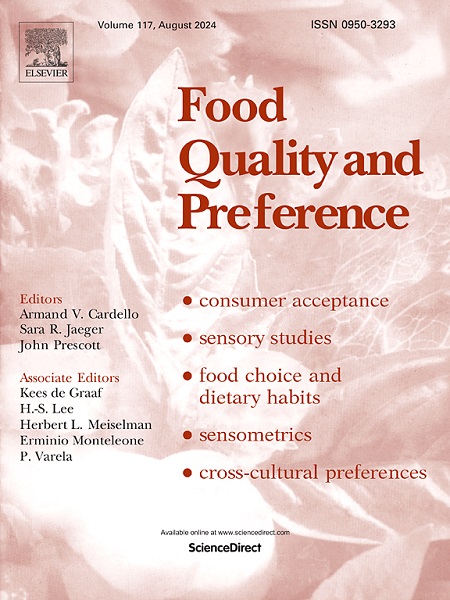小变化,大影响:通过交换推动减少低收入消费者对超加工食品的选择
IF 4.9
1区 农林科学
Q1 FOOD SCIENCE & TECHNOLOGY
引用次数: 0
摘要
为了满足消费者对方便、美味和廉价产品的需求,超加工食品(upf)在世界许多国家越来越普遍。然而,普遍健康食品消费的增加可能导致若干健康问题,特别是在低收入群体中,他们更容易购买不健康的食品。轻推是一种旨在影响消费者行为以达到预期结果的方法。在数字环境中,当一个人选择不健康的食物时,这种交换会建议更健康的选择。在此,我们对810名负责家庭食品采购的低收入意大利人进行了一项实验,要求他们在网上超市中选择主菜和配菜。当选择upf时,建议进行食品交换,提供最低限度加工的替代方案。结果表明,食物交换可以减少低收入消费者对upf的选择,并确定了影响这一目标人群中食物交换有效性的具体个人因素。具体来说,23%的参与者接受了交换,年轻男性,upf消费水平较高,抵抗力较低,更有可能遵循这一推动,这表明在数字环境中有针对性干预的潜力。本文章由计算机程序翻译,如有差异,请以英文原文为准。
Small changes, big impact: Reducing ultra processed foods choices among low-income consumers with a swap nudge
To satisfy consumer demand for convenient, tasty, and inexpensive products, Ultra Processed Foods (UPFs) have become increasingly prevalent in many countries worldwide. This rise in UPFs consumption can however contribute to several health issues, particularly among low-income groups, who are more susceptible to making unhealthy food purchases. Nudging is an approach that aims to influence consumer behavior toward desired outcomes. In the context of a digital environment, the swap suggests healthier alternatives when an individual selects an unhealthy food option. Herein, an experiment was conducted on 810 low-income Italians responsible for household food purchases, who were asked to select a main and side dish in an online supermarket. When UPFs were selected, a food swap was proposed, offering a minimally processed alternative. Results provide evidence that a food swap can reduce the selection of UPFs among low-income consumers and identify specific individual factors that influence the effectiveness of a food swap among this target population. Specifically, 23 % of participants accepted the swap, and younger males, with higher UPFs consumption levels and lower reactance, were more likely to follow the nudge, suggesting the potential for targeted interventions in the digital environment.
求助全文
通过发布文献求助,成功后即可免费获取论文全文。
去求助
来源期刊

Food Quality and Preference
工程技术-食品科技
CiteScore
10.40
自引率
15.10%
发文量
263
审稿时长
38 days
期刊介绍:
Food Quality and Preference is a journal devoted to sensory, consumer and behavioural research in food and non-food products. It publishes original research, critical reviews, and short communications in sensory and consumer science, and sensometrics. In addition, the journal publishes special invited issues on important timely topics and from relevant conferences. These are aimed at bridging the gap between research and application, bringing together authors and readers in consumer and market research, sensory science, sensometrics and sensory evaluation, nutrition and food choice, as well as food research, product development and sensory quality assurance. Submissions to Food Quality and Preference are limited to papers that include some form of human measurement; papers that are limited to physical/chemical measures or the routine application of sensory, consumer or econometric analysis will not be considered unless they specifically make a novel scientific contribution in line with the journal''s coverage as outlined below.
 求助内容:
求助内容: 应助结果提醒方式:
应助结果提醒方式:


